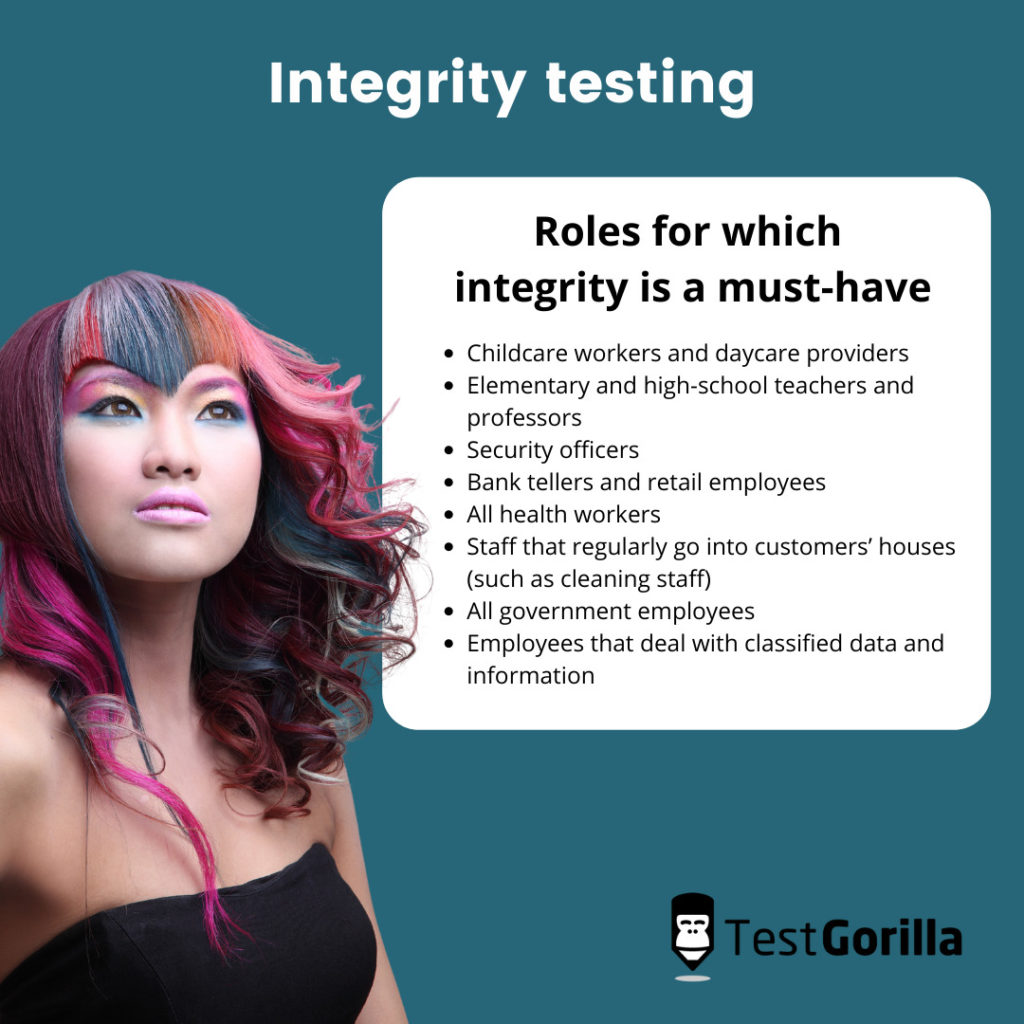Employee integrity testing: Should your company be doing it?
HR teams have been using employee integrity testing for decades, and it’s proven its worth over the years. But there have also been some challenges when it comes to employee integrity testing, such as:
Is it legal and ethical?
How accurate is the ethics test?
Can someone fake integrity?
Which jobs require it, and which jobs don’t?
We’ll answer all of these questions and much more in the following article. But first, let’s see what employee integrity testing is.
Table of contents
- What are employee integrity tests?
- Should your company use employee integrity testing?
- Is employee integrity testing effective?
- Which job positions require integrity and honesty?
- Can candidates fake integrity tests?
- Strategies for hiring candidates with integrity
- The definitive answer to the question of employee integrity testing
What are employee integrity tests?
Employee integrity tests — or, as you may otherwise know them, honesty testing — is a type of pre-employment test, survey, or interview, which tries to predict future misbehaviors in the workplace.
Integrity testing relies on the self-reporting of candidates, and from those answers, employers can better predict if a candidate will behave with integrity — understood as being honorable, honest, and ethical — in the workplace.
Some of the traits of a person with integrity in the workplace are:
Showing up on time
Leading by example
Being accountable and responsible
Respecting other people’s and the company’s property
Confronting gossip when they find it
Talking to peers and managers about breaches of honesty
Giving credit where credit is due
Reporting unethical, illegal, and unlawful behavior
Being open and honest when communicating with colleagues
How did employee integrity testing come to be?
Employee integrity testing became popular back in the 1980s when the US government signed the EPPA (Employee Polygraph Protection Act) that banned companies from using polygraph tests when hiring a candidate.
Ever since then, companies have shifted to using integrity tests to assess their candidates’ honesty.
Integrity tests come in two forms: overt and covert.
Overt tests ask candidates about their previous behavior, which indicates what their future behavior might be. These tests ask directly about dishonest practices such as theft, absenteeism, compensation fraud, or even cyberloafing.
Covert tests are based on personality tests. With these, the employer is looking for personality traits that could correlate with dishonest or negative behavior at the office.
Should your company use employee integrity testing?
Employee integrity testing isn’t a perfect tool, and there are three challenges/problems when it comes to the test:
First of all, employee integrity testing itself relies on answers from the applicant. Effectiveness will therefore depend on the candidate’s level of honesty.
Then there’s the ethical question regarding integrity testing. Critics claim that it’s unethical not to hire someone just because they show a tendency toward a specific behavior. If some candidates displayed misbehavior in the past, it doesn’t mean that they will do the same in the future. Past behavior doesn’t equal future actions — and past behavior could also result from situational factors.
On top of that, there are possible legal issues. Companies that use integrity tests must be aware of the laws and regulations since there’s a thin line between assessing a candidate’s integrity and having a discriminatory practice. Back in the 1990s, Target crossed this line and a candidate sued the company for asking questions regarding personal beliefs and sexual orientation.
Oh, and if you’re based in Massachusetts, you can’t use written tests for assessing your candidates: the state banned any written test for hiring purposes.
The best insights on HR and recruitment, delivered to your inbox.
Biweekly updates. No spam. Unsubscribe any time.
Is employee integrity testing effective?
Employee integrity testing is effective — under certain conditions.
If you’re using integrity testing as a way to narrow down your applicants, you might miss out on some great candidates. Integrity tests can sometimes provide a false positive/negative and eliminate a suitable candidate from the hiring process.
So employee integrity testing shouldn’t be used as the first contact with your candidates, but instead at later stages when you have already narrowed down your candidate pool. The best way to use employee integrity testing is together with tools such as background and reference checks.
Which job positions require integrity and honesty?
There are certain jobs in which integrity and honesty are more important than others. Using an employee integrity test is a must-have for the roles in which employees deal with security, valuable and sensitive data, money, or children.
Roles for which integrity is a must-have
The following roles all require employee integrity testing:
Childcare workers and daycare providers
Elementary and high-school teachers and professors
Security officers
Bank tellers and retail employees
All health workers
Staff that regularly go into customers’ houses (such as cleaning staff)
All government employees
Employees that deal with classified data and information
If you’re hiring a candidate for any roles mentioned above, you need to give them an integrity test. Any risky behavior in those areas could cost the company trust, customers, money, or lead to legal problems. So give your candidates integrity tests to find any red flags in their behavior.
Is integrity always desirable?
Under the right circumstances, the “bad” traits of a person can become superpowers. Some of the questions in integrity testing deal with taking risks. In some jobs, such as bank telling, taking risks should be minimal, and the person should follow the rules (almost blindly).
But what about hiring for a startup in the Silicon Valley, where you need candidates who’ll think outside the box, challenge authority, and take some risks to gain massive rewards? In these situations, a candidate who scores low on certain criteria in an integrity test may be what you need.
As noted by Gautam Mukunda, an Assistant Professor at Harvard Business School, it’s about figuring out where you can use your “bad” traits in a good way — where they can be intensifiers.
Taking risks is all about the context of a given situation and what you need at your company at a specific moment.
As writer Po Bronson said, “All of Silicon Valley is based on character defects that are rewarded uniquely in this system.”
Can candidates fake integrity tests?
Faking is a problem with many tests, especially if you rely on the candidate’s honesty to gain insights from the answers. When you’re testing employees for integrity, they might just respond with what the employer wants to hear.
That’s also one reason why you shouldn’t use employee integrity testing as a way of narrowing down your talent — you will get a handful of false positives. Candidates will read questions such as “Would you steal from your work if you could get away with it?” and immediately know what the employer expects from them.
It’s better to use an employee integrity test alongside other pre-employment tests such as Jung’s 16 Personalities test, Big 5 (OCEAN), and Enneagram personality test. Also, you need to be careful when picking out your test providers since not all tests are made equal.
Some companies include lie scales in their tests, a mechanism created to “catch” candidates who try to tweak their answers. Well-designed tests by subject matter experts, such as those provided by TestGorilla, can help you eliminate most false positives.
Strategies for hiring candidates with integrity
Companies want to hire candidates with integrity. The following three steps might help you with that.
Pre-employment tests
The first step when it comes to finding a candidate with integrity is to use pre-employment tests. This step involves combining multiple tests so you can find the candidate who displays the most integrity.
The key with pre-employment tests is that you should give more than one to your candidates so you can assess multiple criteria. One basic thing that can help you assess candidates’ honesty and integrity is verifying the claims on their CVs.
According to this survey, 78% of candidates “stretch the truth” on their resumes during the hiring process. You should always verify the claims on their CVs by giving your candidates pre-employment tests.
These don’t strictly have to be employee integrity tests. If your candidate stated in their CV that they are fluent in Swedish, simply give them a Swedish Language test to verify that claim. If they are fluent in the language, that will be evidence of their integrity. And if they’re not, it is a clear red flag for that candidate.
Depending on the severity of the claim, like applying for a developer’s job without knowing how to code in Python, PHP, or C#, you may as well end the candidate’s hiring journey on the spot.
Personality tests
Recruiters and hiring managers know that it takes more than technical skills for a candidate to fit in the company.
The candidate needs to be a culture add and fit in with the team’s energy, atmosphere, value-set, and communication framework. So giving the candidate a Culture Add test to assess how their values, behaviors, and interests align with your company is a start.
You should also use personality tests such as the Big 5 OCEAN test or Enneagram test to better understand your candidates’ personality traits such as openness, extraversion, emotional intelligence, etc.
Behavioral interview questions
When the candidate reaches the interview stage of the hiring process, you should assess their integrity. Use behavioral interview questions such as the following during the interview phase:
Tell me about a goal you failed to achieve. How did you communicate that to your manager and your team?
Can you give us an example of when you felt dissatisfied with your work? What did you do afterward?
Tell me about a time you had to confront someone about dishonesty? How did you do it?
Can you give us an example in which you had to give your manager feedback? What did it look like?
Can you describe a time when you had to stand up for your values and beliefs? How did you do it?
What does integrity mean to you?
The definitive answer to the question of employee integrity testing
Hiring managers started using employee integrity testing more than 40 years ago, but it’s still relevant today. It’s not used to narrow down the talent pool because there remain issues with false positives/negatives, but an employee integrity test is used later on in conjunction with background and reference checks.
Tests are a great way to evaluate your candidates. There are many types of pre-employment tests such as cognitive, personality, role-specific, software, language, situational judgment, and many others. Check out how to hire the best candidates with skills assessment tests at TestGorilla.
You've scrolled this far
Why not try TestGorilla for free, and see what happens when you put skills first.
















